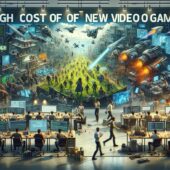The way children and adults spend their free time has changed dramatically with the advent of computer games. Everyone is drawn to the screen like a magnet. A wonderful world lives its own life, and you can enter and change it at any time. The computer has made gaming not only accessible but also exciting, as instant reactions demand quick responses. They’re more than thrills — they’re dramas, philosophies, and attitudes about time and place. And the level of freedom here is almost unlimited. In games, people can achieve the unattainable — to shape the reality around them as they wish, even if it is virtual. Reality often creates additional stress. That is why FCLOANS can sometimes make life easier.
Computer games are attractive for many reasons, and everyone has different priorities. For some, the most interesting thing is that the computer reacts as appropriately as possible to every action you take, allowing you to feel empowered. Others prefer to feel all-powerful, able to control a certain fantastic reality and transform the game world exclusively according to their taste. Someone returns to the computer again and again because they want to feel it more. Someone may use games to “escape” from a less positive reality, simply because “living” in the virtual world is easier and more pleasant. It is also easier to realize in the virtual world what is not possible in real life.
It is logical that there are certain reasons why computer games are so popular. What motivates people to spend their free time playing games?
- The plot or emotional aspect. This is primarily the artistic qualities of the storyline of the game. This includes the emotional mood of the game, the appearance, and the style of graphics. In many ways, these are the same reasons why people choose fiction books or movies. However, in the case of computer games, the interactivity and the ability to influence the outcome of events make the difference.
- Rolling. This term is used by players to describe the growth of virtual skills, the acquisition of new abilities during the game, including influencing the game world, and the acquisition of new, more powerful tools for solving game tasks. This process in itself is very attractive to the player. Perhaps this can be seen as a proxy for the self-development motive.
- Achievements. Defeating an opponent (real or virtual), achieving a goal (completing a task, a mission, etc.), competing (with the ideal in a single-player game and with other players in a multiplayer game). In addition, the uncompleted task will keep your mind in the game until you reach the objective (new level) and complete the task. When interrupted by external circumstances, thoughts return to the unfinished action.
- Intellectual satisfaction. The process of problem-solving, the pleasure of mental activity, and intellectual achievements are similar to the pleasure people get from doing crossword or jigsaw puzzles.
- Exploration and research. The ability to explore the game, the game world, the rules, the objects, and the possibility to research everything that the authors have put into a particular game.
- Creativity. The ability to create something new and individual within the game.
And finally, non-gaming aspects: socialization, leisure, emotional release, escape from reality. These are not related to the process of playing itself, but they usually come along with it.
All of this has made computer gaming a new sport. E-sports differ from sports in that it is possible to achieve high results without a developed infrastructure — all you need is the Internet and a good computer.
In e-sports, you can play for fun or set big goals for yourself — win some medals and prizes. In other words, you can do it professionally. But just like in regular sports, many people practice and compete, but not many become champions — only those who are the most talented and the most determined. It’s the same in e-sports — many people compete, and millions play, but only a few become world champions, famous, and make money.
Today, computer games have become not only entertainment but also a carrier of culture. They capture contemporary morals, ethics, illusions, hopes, and ideas about people’s past and future. A computer game, as a constructed world, carries the worldview of its creators and users who have chosen this product. They have decided what is good and what is bad, what to do and what not to do, and what to strive for and at what cost. People have reflected on their ideas about the past, future, and life in the game, and this information is recorded and available for study by anyone interested in it.







